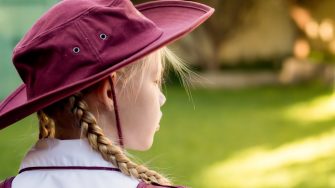Microcredential Unit in Special and Inclusive Education: Students on the Autism Spectrum
- Next Dates
- Ongoing
- Duration
- 150 hours
- Delivery mode
- Online
- Price (AUD inc. GST)
- $695
- Spots remaining
- AVAILABLE
- Digital badge credential
-

-
- 6 Units of credits

- Course summary
- About
- Outcomes
- Schedule
- Credentials
- Next steps
Course summary
Build on your short course with postgraduate study in special and inclusive education
This fully online, flexible course explores evidence-based practices, theories, societal attitudes, legislation and policy related to supporting students on the autism spectrum. By completing self-paced modules, self-directed activities and two written assessments, you’ll gain valuable skills and earn 6 Units of Credit (UOC) toward a postgraduate qualification in education.
Enrolment in the microcredential is only available to those who have completed the now-retired Supporting Students on the Autism Spectrum short course, which ran from 2020 to 2024.
Who will benefit
- Teachers seeking to enhance their ability to support students on the autism spectrum, especially in differentiated or inclusive classrooms
- School leaders who wish to implement best practices for special and inclusive programs in their schools
- Educators looking to advance their qualifications, earn academic credit and fast-track their pathway toward a Master of Education (Special and Inclusive Education) or Graduate Certificate (Special and Inclusive Education).
Course is suitable for
- Learning support teachers looking to further their studies with a postgraduate study program.
- Those who completed the Supporting Students on the Autism Spectrum short course, which ran from 2020 to 2024 (now retired).
- Teachers and school leaders who want to deepen their knowledge or specialise in special and inclusive education to improve school practices and support the needs of students on the autism spectrum.
Delivered by experts
Course designed to stack
About the course
Support diverse learners through specialised education
This course is ideal for those looking to advance their knowledge and pursue further postgraduate study in the field of autism and education.
Through interactive online learning and two written assessments, you’ll explore current theories, research and practical strategies for supporting students on the autism spectrum.
The successful completion of this unit will equip you with current knowledge about characteristics and effective evidence-based practices used to assist students on the autism spectrum to accomplish their educational goals. You will also be able to develop your professional judgments and teaching practices using theories, societal attitudes, legislation and policy.
Why enrol in this course
Progress to postgraduate study
Fast-track your progression into further postgraduate education.
Flexible learning
The course is fully online, offering flexibility to balance work and study, with a recommended completion time of 12 months.
Specialise in special and inclusive education
This course allows you to develop or update your skills and specialise in the needs of students on the autism spectrum, equipping you with the knowledge to effectively support students in your classroom.
Evidence-based and practice-oriented
Explore current research, theory and real-world strategies to confidently support students on the autism spectrum in educational settings.
Key features

This course provides a pathway to further postgraduate study, offering 6 UOC and allowing you to advance your qualifications in less time.

Apply theory through real-world assessments that directly improve your teaching practice in special and inclusive education.

Translate theory and policy into educational strategies for teachers to use in the classroom.

Build specialised expertise to pursue leadership, consultancy or further study in the education sector.
Learning outcomes
Fast-track your path to postgraduate study
This course will equip you with advanced skills to support students on the autism spectrum. You will learn to critically engage with the theories that shape prevailing attitudes toward individuals on the spectrum and apply relevant legislation and policy to inform your professional judgments and decisions. The course will also enable you to articulate current issues and trends in the field to relevant stakeholders and make effective curriculum adjustments to help students on the autism spectrum achieve their educational outcomes.
What you'll learn
You'll engage with self-paced IRIS modules to learn about the importance of identifying and selecting evidence-based practices, how to implement these practices or programs with fidelity and how to evaluate their effectiveness for the students you work with. Through two assessments, you will deepen your understanding of autism while developing critical thinking, research and evaluation skills. You will also apply theory and policy to explore and enhance educational strategies for teachers.
Topics covered
- Identifying and selecting a practice or program
- Implementing a practice or program with fidelity
- Evaluating learner outcomes and fidelity
Course delivery
Format | Commitment | Delivery | Method |
|---|---|---|---|
|
|
|
|
Schedule
Module 1 | Module 2 | Module 3 |
|---|---|---|
| Identifying and selecting a practice or program | Implementing a practice or program with fidelity | Evaluating learner outcomes and fidelity |
Credentials
Gain a microcredential
This microcredential is equivalent to EDST5113 | Students on the Autism Spectrum and is eligible for 6 Units of Credit (UOC), which can be applied toward a postgraduate program in Education.
Upon successful course completion, you will be issued with a Certificate of Attainment.
How can I use my credit towards further study?
By completing the course, you can apply for Recognition of Prior Learning (RPL) to have these credits transferred upon commencing a Master of Education (Special and Inclusive Education) or Graduate Certificate (Special and Inclusive Education).
Next steps
Enrolment in the Microcredential Unit in Special and Inclusive Education: Students on the Autism Spectrum is available by request.
To submit a request, please contact ada.sc@unsw.edu.au.
Skills and career
Skills
Career roles
Course is suitable for


